(UPDATED) Vice President Jejomar Binay's name, vast political experience, and formidable political machinery are not enough to make him the 16th president of the Philippines. What went wrong?
THE CANDIDATE. Vice President Jejomar Binay promises a better life for Filipinos during his miting de avance on May 7, 2016. Photo by Rob Reyes/ Rappler
MANILA, Philippines (UPDATED) – He fought the toughest and the longest battles, but the war was not for him to win.
Of the 5 candidates, it was only Vice President Jejomar Binay who dreamt of becoming president as he fed his uncle’s pigs when he was a young boy in Makati. (READ: Cinderella Man)
Binay’s rags-to-riches story propelled him to the vice presidency in 2010 and soon after, he was announcing his plan to gun for the highest post in the land.
That came with a hefty price: a 20-month investigation in the Senate that dug up multiple allegations of corruption and unexplained wealth against the Makati mayor of 21 years. (READ: The Bandit King)
The early survey front-runner’s ratings started dipping late 2015, but Binay briefly recovered and by early 2016, even tied Senator Grace Poe for the top spot – all thanks to his strategy of silence coupled with a disciplined ground campaign.
But when the campaign period began, the tide turned. People were clamoring for change, one that almost 16 million Filipinos believed only Davao City Mayor and now President-elect Rodrigo Duterte could deliver.
So even if Binay had the name, the vast political experience, and the formidable machinery to make him the 16th president of the Philippines, these were not enough to turn his childhood dream into reality. (READ: The tragedy of Jejomar Binay)
“We were stuck in one strategy. We were unable to shift when it was necessary to do so,” a campaign insider told Rappler days after the May 9 elections.
Messaging that lacked teeth
THE SCRUM. There were weeks during the campaign when it was difficult for reporters to catch Binay for an interview. Photo by Rob Reyes/Rappler
According to political analyst Aries Arugay from the University of the Philippines (UP), Binay’s campaign message was clear from the get-go, but it “fell short.”
The tagline “Giginhawa ang buhay kay Jojo Binay (Life will be better with Jojo Binay)” meant free healthcare and education, the expansion of the government’s conditional cash transfer program, and the abolition of income tax for the poor.
The short and dark-skinned nognog Binay promised these after resigning from the administration of President Benigno Aquino III, which he fiercely described then as “manhid at palpak (insensitive and a failure).”
But it was not enough, said Arugay, because Binay stopped there. (READ: Why Duterte's message of 'care and power' attracts)
“‘Di na enough ‘yung message ni Binay na ‘aalagaan ko kayo’ kasi ‘yung alaga, kung walang tapang at walang political will to really implement the law and really make the accountable, accountable [for their indiscretions], wala rin,” said Arugay.
(Binay’s message of “I will take care of you” was not enough because if you promise care without showing you have the political will to really implement the law and to really make people accountable for their indiscretions, it’s futile.)
“Binay tried to be this effective leader, tried to attack the Aquino administration, but he fell short because Duterte’s message was stronger and more persuasive,” he added.
It is a sentiment shared by one of Binay’s campaign advisers, newly-elected Quezon Third District Representative Danilo Suarez.
The Vice President, a former human rights lawyer, often said he would let the rule of law run its course when asked by the media how “President” Binay would punish those who did the people wrong. Duterte, for his part, was openly saying he would shoot criminals who would resist arrest.
Suarez said Binay’s pragmatism could have stemmed from the fact that the United Nationalist Alliance (UNA) standard-bearer wanted to become a healing and unifying president.
“Sinabi mo nang manhid at palpak; sana tinuluyan mo na. Sana sinabi mong ipakukulong kita(You said the administration was insensitive and a failure; you should have just followed through. You should just have said, I'll send you to jail)," Suarez told Rappler.
"But he stopped there. I don’t know why he stopped. Maybe he’s coming from the position that he’ll be a healing president and all….I don’t believe that. I believe in throwing all the hammer and tongs to your political opponent if there is an opportunity,” he added.
Allegations left unanswered
MAN OF THE HOUR. Did Binay do enough during the campaign to convince his supporters that the allegations against him are untrue? Photo by Alecs Ongcal/Rappler
Arugay said it also did not help that, at least in the general public’s eye, Binay did not face his corruption allegations head-on.
According to Arugay, the accusations pulled Binay’s numbers down and “conditioned” voters’ minds that there are parts of the Vice President’s character that should not be trusted.
“This is the longest [set of] hearings ever, in our history. Kung araw-arawin ka ba naman (He was the focus every day). All the resources of the forces that were preventing him to be president were spent. Ang aga ng investment (The investment was made early) in assassinating his presidential chances,” said Arugay.
Binay refused to appear before the Senate blue ribbon subcommittee and only submitted an 8-page affidavit to explain his side.
Every time embedded journalists asked him about the accusations, the Vice President would say there is no truth to the charges, yet he did not produce counter-evidence for the public to see. He and his spokesmen would always bring the conversation back to poverty which, they said, was the current “moral” problem that should be addressed.
For UNA secretary-general JV Bautista, this image was a far cry from the Binay that fought for the rights of political detainees during the Martial Law years.
“He was sparse in the interviews, he was inaccessible. Mali ‘yun (That’s wrong). Look at Duterte….Jojo Binay, because of the message discipline that was imposed on him, lost a great deal of spontaneity that the people were looking for. Because spontaneity translates into sincerity,” said Bautista.
During the Cebu presidential debate in March, Binay finally tried to present documents that he said would discredit his accusers, but he was later barred from doing so because all forms of cheat sheets were not allowed in the debates.
For UP political analyst Jean Encinas-Franco, this move not only came too late in the campaign; the debate was the wrong place to do that as well.
“He brought out those documents. It’s really not the venue. It was one of the biggest mistakes. He sounded so defensive and it was a belated way of responding to the accusations and it’s not really the proper venue,” said Franco.
Suarez also said Binay “did not earn points” during all 3 presidential debates as he performed poorly compared to his rivals.
Losing the machinery
ONLY BINAY. Around 5.32 million voters believed the Vice President would help bring them out of poverty. Photo by Rob Reyes/ Rappler
Binay’s accusers then managed to plant seeds of doubt in the minds of the Vice President’s core supporters from Classes D and E.
“I think we started losing the elections from the time that we failed to really confront the accusers,” said Bautista.
He explained that while the core support held for several months, it became much easier for them to be swayed once the other candidates started rising in the polls to catch up and eventually overtake Binay.
Suarez also said UNA “lost the machinery” and with it, the flow of campaign funds. Of the 44,757 national and local positions in the ballot, only 4,314 candidates ran under UNA.
Several defections from longtime allies from vote-rich provinces also hurt the Binay campaign, including the Garcias of Cebu and Governor Jonvic Remulla of Cavite.
The clout of Binay’s parallel groups – the non-partisan organizations that campaigned for him – may not have been as strong as it was in 2010. These include Binay’s fraternity brothers from the Alpha Phi Omega (APO), his UP classmates, the Makati sister cities, and the Boy Scouts of the Philippines. (READ: CAMPAIGN NOTES: Binay’s ‘personal’ political machinery)
An APO member from Davao City said the marching order was for them to support Binay. “Pero hindi gusto sa ground ‘yung mga allegations sa kanya (But those on the ground didn’t like the allegations against him),” said the fraternity member.
Suarez said Binay also lost his popularity among the poor, a strong indication of which was his difficulty finding a running mate and completing his Senate slate.
“In political parlance, if you are not organized, if you don’t have strong political machinery, you need to be extremely popular, just like what happened to Digong. PDP-Laban is one of the smallest political groups, and yet, nanalo (he won),” said Suarez.
Not even calling Duterte a “berdugong mamamatay ng tao (an executioner of the people)” was enough for Binay to stop his supporters from switching sides.
Binay still in the game?
HIS NEXT MOVE. Plunder complaints await Binay as he steps down as Vice President. Will he succeed against them? Photo by Rob Reyes/Rappler
Still, both Suarez and Bautista agreed that it was right for Binay to announce his bid early because it allowed him to visit most of the provinces in the country and to build his machinery.
The problem was that he failed to sustain his momentum, slowly fading to the background when people wanted a candidate who stood out.
Arugay also said the Vice President’s campaign team decided to stick with their strategy in 2010, the year he emerged the dark horse victor of the vice-presidential race.
“It was an old style because the guy never lost the elections, so why tweak something that worked before? Why tweak something that was effective? He just wasn’t able to adjust to the contours of the Filipino electorate, and he suffered the consequences,” said Arugay.
Binay was the third presidential candidate to congratulate Duterte in his victory, a move which, his camp said, should not be considered a formal concession yet. The Vice President said he would wait until the official release of the results by Congress.
Lawyer Rico Quicho thinks "hindsight is 20/20." He was the campaign spokesperson for Binay.
"Just like running a marathon, the challenging and gruelling part is hitting the 'wall.' We endured and overcame it. But other runners just finished the race faster than us," said Quicho, who made the caveat that this comment is his "personal opinion."
"Experts and our alies can dissect and try to be scholar about their observations, but at the end of the day, it is his destiny and not ours. Kapag lamang, palakpakan nang palakpakan. Kapag naghahabol, sisihang nang sisihan (When we were leading, they applauded. When we were catching up, they pointed fingers). Not me. I always fight the good fight," added Quicho.
Still, those close to Binay told Rappler that Filipinos should expect him to somehow play an active role in politics in the next 6 years despite his loss.
Like the seasoned politician that he is, Binay is now going around the country to thank the allies who remained by his side. Sources said he is also studying what roles he and UNA can play under a Duterte presidency.
“He may be down, but he’s certainly not out. Don’t count Jojo Binay out,” said a campaign insider.
Now, a new battle is looming ahead for Binay: the Ombudsman finding probable cause to indict him with criminal charges over the alleged overpricing of the Makati City Hall Parking Building II. Ombudsman Conchita Carpio Morales said she plans to bring the case before the anti-graft court Sandiganbayan at the end of Binay's term.
The Vice President told Rappler he has nothing to fear, saying he knows the accusations against him will not hold in court.
"Practicing lawyer ako. Ang abogado malalaman kung mananalo or matatalo siya sa case," he said. (I'm a practicing lawyer. A lawyer knows if he will win or lose his case.)
Will Binay become victorious this time around? – Rappler.com
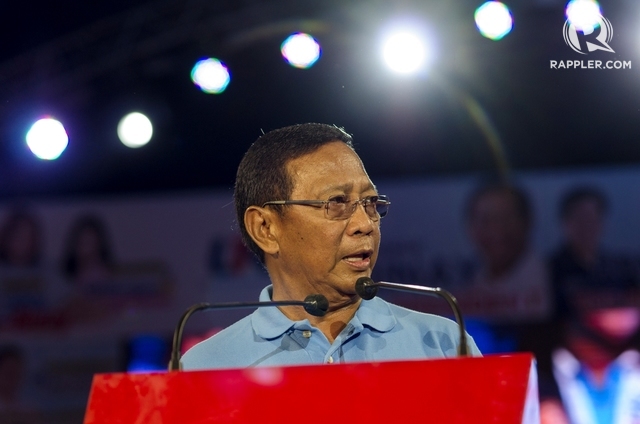
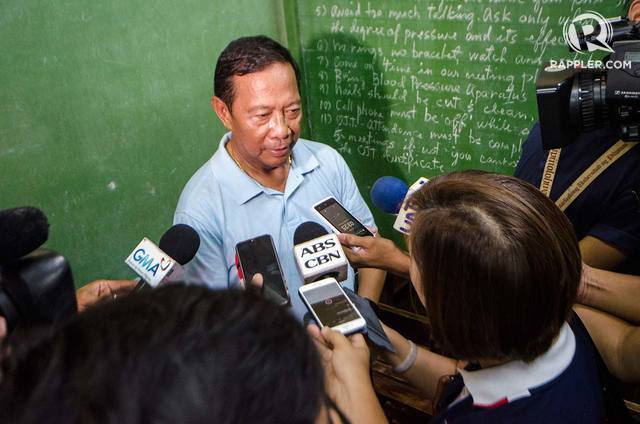
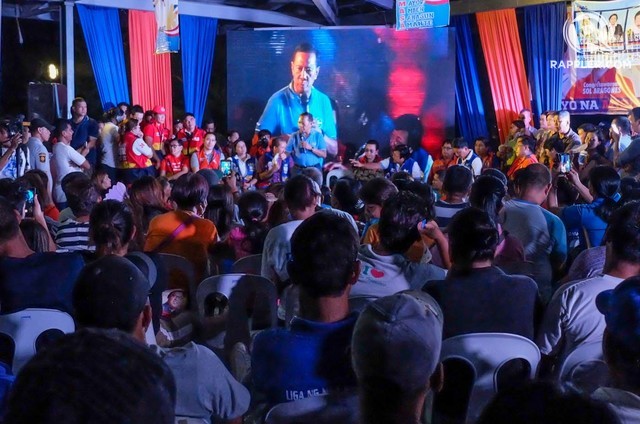
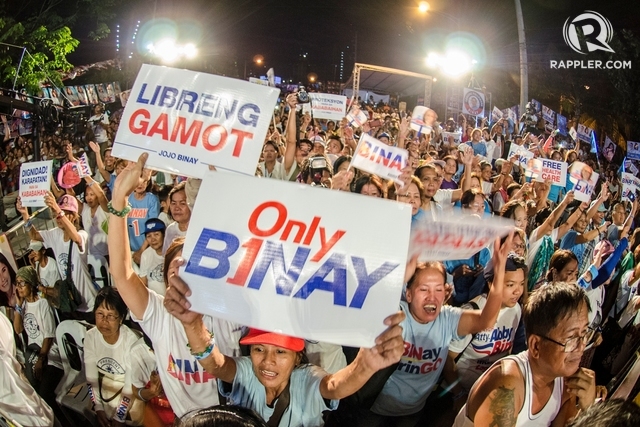
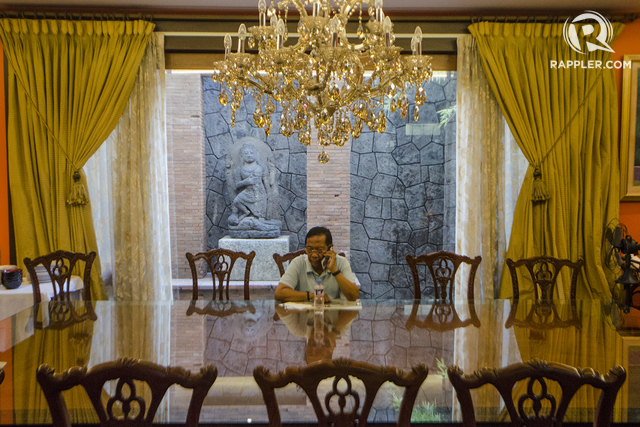
No comments:
Post a Comment